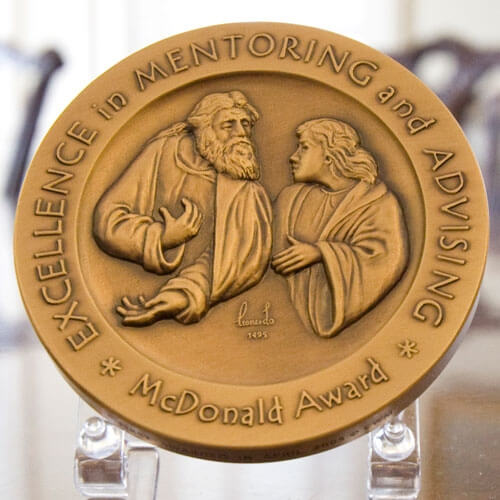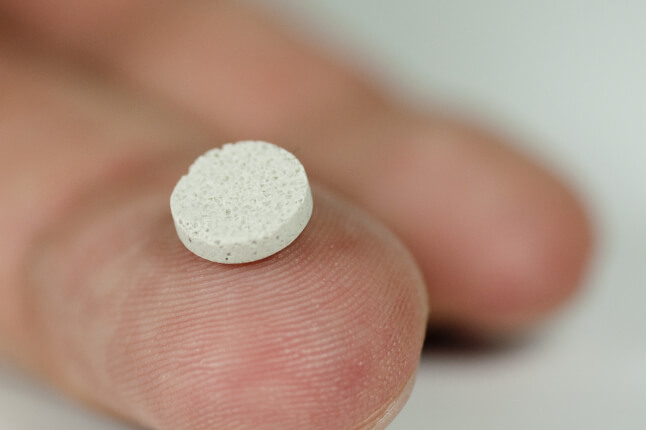News
The central design of the medallion depicts an elder advisor and engaged youth. It is derived from a 1495 developmental sketch by Leonardo da Vinci. (Photo by Eliza Grinnell, SEAS Communications.)
Cambridge, Mass. – February 22, 2013 – Biomedical engineer Sujata Bhatia and computer scientist David C. Parkes were honored today with the Capers and Marion McDonald Award for Excellence in Mentoring and Advising at the Harvard School of Engineering and Applied Sciences (SEAS).
Established at SEAS in 2008 by Capers W. McDonald and Marion K. McDonald, the award recognizes leaders in engineering and applied sciences “who, as exemplary mentors and advisors, have significantly and consistently supported the personal and professional development of others.”
Parkes was selected for the annual award in 2012, while he was away on sabbatical. As a result, both Parkes and Bhatia were today recognized at an All Hands Meeting of faculty and staff, where they received engraved medals from Dean Cherry A. Murray.
"By recognizing individuals who so generously lend their leadership and experience to others’ development, and who consistently perform above and beyond the call of duty, the McDonald Mentoring Award immeasurably strengthens the community we call SEAS," Murray said.
David C. Parkes
George F. Colony Professor of Computer Science; Harvard College Professor
Nominated by a significant number of his colleagues, postdoctoral fellows, and graduate students at SEAS, Parkes was recognized for his selfless contributions to creating a welcoming, collaborative, and productive community of scholars in computer science.
The nominating letters praised his insightful and detailed advice, his “50-hour” workday, his attention to professional development, and his willingness to promote the work of others. Junior faculty said that Parkes creates an atmosphere in which they feel safe raising personal concerns and showing weakness, and he offers thoughtful feedback that helps them to navigate challenges in their professional lives.
“Whether offering weekly lunch meetings to new colleagues, sharing his grant proposals as examples to other faculty, or volunteering to advise numerous undergraduates’ senior theses, David demonstrates an exceptional commitment to supporting and mentoring those in need,” said Murray.
In doing so, he sets an example. Parkes’ mentorship, one grateful colleague wrote, “inspired me to think of the many ways in which we junior faculty play a key role in listening, advising, and helping each other out.” In this way, his individual actions are contributing to a lasting culture of openness, trust, and mutual respect among computer scientists at SEAS.
Parkes’ research into multi-agent systems, game theory, and mechanism design creates a bridge from the world of computational theory to pressing social and economic issues like data privacy and e-commerce.
“I found him to be both a brilliant academic and a charismatic person with a refined, intuitive sense of how to bring out the best in everybody,” wrote one researcher in this area. “David has an extraordinary gift for motivating people and I cannot think of a better role model.”
Sujata Bhatia
Assistant Director for Undergraduate Studies in Biomedical Engineering; Assistant Dean, Harvard Summer School; Associate, Harvard Kennedy School
In nominating Bhatia for the McDonald Award, current and former students praised her “cheerful, energetic presence,” her around-the-clock availability to meet with them, her tireless promotion of engineering ethics, and her talent for inspiring confidence and passion.
In addition to her multiple leadership roles across Harvard, Bhatia serves as a freshman proctor, meeting students in the earliest days of their studies on campus and supporting their academic progress. “She encourages me to learn for the sake of learning and not fear making mistakes,” wrote one student. From matriculation to Commencement, Bhatia guides students through their coursework in biomedical engineering, identifies laboratory research opportunities and conferences for them, and advises senior theses. With Bhatia’s help, several of these undergraduates have had their theses accepted by professional publishers.
Bhatia has also worked to build community at SEAS and cultivate pride in engineering—for example, through social events and by encouraging students to join the Order of the Engineer, an international professional society.
She also leads by example. After she encouraged a group of undergraduates to pursue professional licensure through the National Council of Examiners for Engineering and Surveying, several students took (and passed) the Fundamentals of Engineering (FE) exam. Meanwhile, Bhatia studied for, and passed, the more advanced exam for professional licensure, demonstrating what will also be possible for them down the road.
One student recalled how he had felt lost, lacking direction in his studies and goals until meeting with Bhatia for the first time. “I voiced my concerns and she told me, ‘You can change the world,’” he wrote. “Sujata has made me fall in love with my concentration.”
Prior to arriving at Harvard, Bhatia earned the degrees B.S., B.ChE., M.ChE., M.D. and Ph.D. in a period of just eight years, and spent another eight as a principal investigator at DuPont, where she developed bioadhesives for wound closure and created minimally invasive medical devices. Students have commented on the importance of her academic background and industry experience in shaping their senior design projects, as well as their aspirations.
Bhatia does not hesitate to share her own personal story in order to act as a visible role model, especially to young women seeking careers in engineering.
“Her patents, publications, honors, awards, and faculty positions are more than impressive,” wrote one alumnus. “But it is difficult to show on her CV how kind and warm a mentor she is, and how much she truly cares for the undergraduates she advises.”
“She showed me all of the doors an engineering degree opens for me in the real world, something that I had never thought much about,” wrote an alumna. “She altered my outlook on engineering and really encouraged and mentored me for my current and future studies. … Even after having graduated, I am still in contact with Dr. Bhatia on a continuous basis.”
Topics: Computer Science, Bioengineering
Cutting-edge science delivered direct to your inbox.
Join the Harvard SEAS mailing list.



